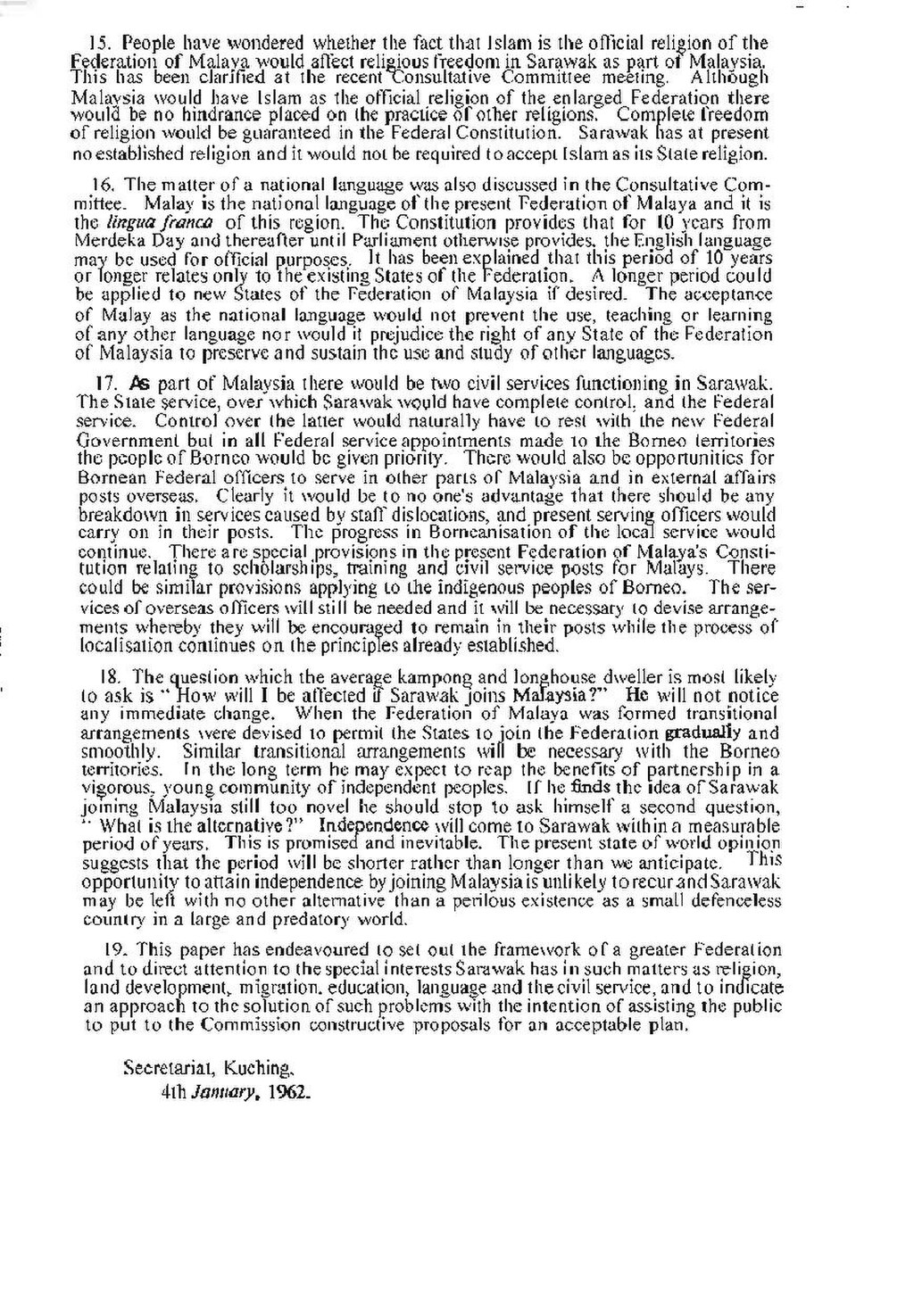15. People have wondered whether the fact that Islam is the official religion of the Federation of Malaya would affect religious freedom in Sarawak as part of Malaysia. This has been clarified at the recent Consultative Committee meeting. Although Malaysia would have Islam as the official religion of the enlarged Federation there would be no hindrance placed on the practice of other religions. Complete freedom of religion would be guaranteed in the Federal Constitution. Sarawak has at present no established religion and it would not be required to accept Islam as its State religion.
16. The matter of a national language was also discussed in the Consultative Committee. Malay is the national language of the present Federation of Malaya and it is the lingua france of this region. The Constitution provides that for 10 years from Merdeka Day and thereafter until Parliament otherwise provides, the English language may be used for official purposes. It has been explained that this period of 10 years or longer relates only to the existing States of the Federation, A longer period could be applied to new States of the Federation of Malaysia if desired. The acceptance of Malay as the national language would not prevent the use, teaching or learning of any other language nor would it prejudice the right of any State of the Federation of Malaysia to preserve and sustain the use and study of other languages.
17. As part of Malaysia there would be two civil services functioning in Sarawak. The State service, over which Sarawak would have complete control, and the Federal service. Control over the latter would naturally have to rest with the new Federal Government but in all Federal service appointments made to the Borneo territories the people of Borneo would be given priority. There would also be opportunities for Bornean Federal officers to serve in other parts of Malaysia and in external affairs posts overseas. Clearly it would be to no one's advantage that there should be any breakdown in services caused by staff dislocations, and present serving officers would carry on in their posts. The progress in Borneanisation of the local service would continue. There are special provisions in the present Federation of Malaya's Constitution relating to scholarships, training and civil service posts for Malays. There could be similar provisions applying to the indigenous peoples of Borneo. The services of overseas officers will still be needed and it will be necessary to devise arrangements whereby they will be encouraged to remain in their posts while the process of localisation continues on the principles already established.
18. The question which the average kampong and longhouse dweller is most likely to ask is "How will I be affected if Sarawak joins Malaysia?" He will not notice any immediate change. When the Federation of Malaya was formed transitional arrangements were devised to permit the States to join the Federation gradually and smoothly. Similar transitional arrangements will be necessary with the Borneo territories. In the long term he may expect to reap the benefits of partnership in a vigorous, young community of independent peoples. If he finds the idea of Sarawak joining Malaysia still too novel he should stop to ask himself a second question, "What is the alternative?" Independence will come to Sarawak within a measurable period of years. This is promised and inevitable. The present state of world opinion suggests that the period will be shorter rather than longer than we anticipate. This opportunity to attain independence by joining Malaysia is unlikely to recur and Sarawak may be left with no other alternative than a perilous existence as a small defenceless country in a large and predatory world.
19. This paper has endeavoured to set out the framework of the Federation and to direct attention to the special interest Sarawak has in such matters as religion, land development, migration, education, language and the civil service, and to indicate a approach to the solution of such problems with the intention of assisting the public to put to the Commission constructive proposals for acceptable plan.
Secretariat, Kuching,
4th January, 1962.
